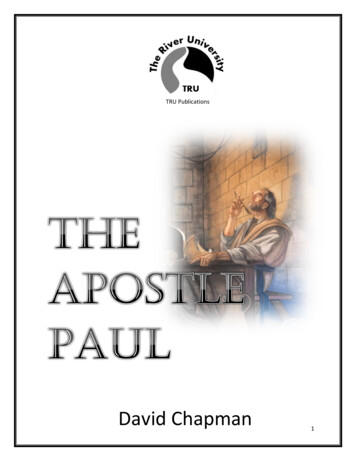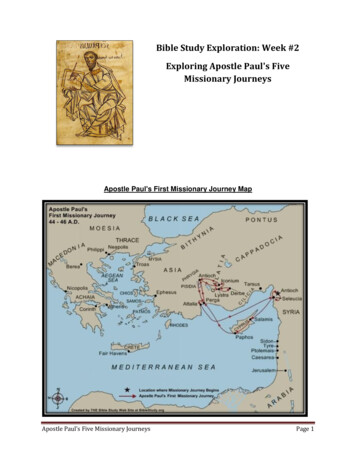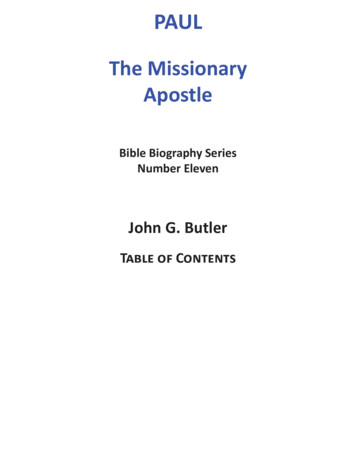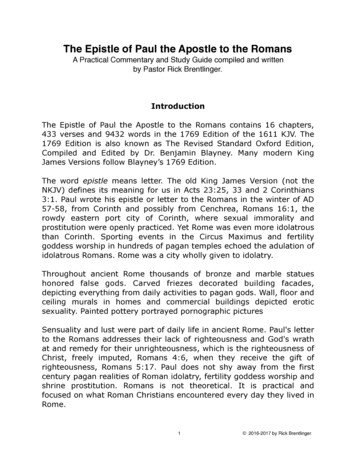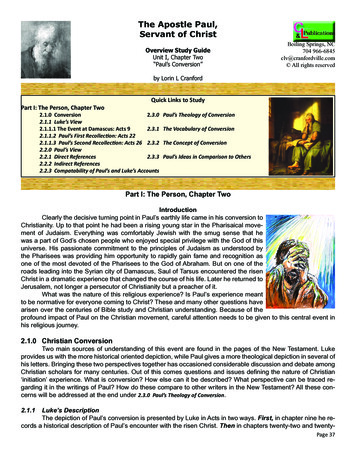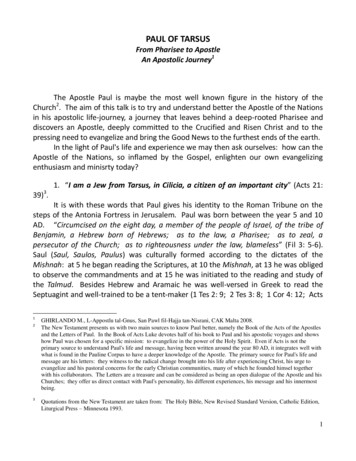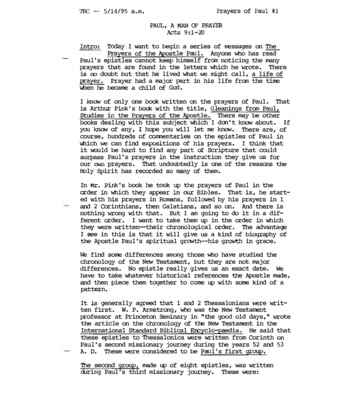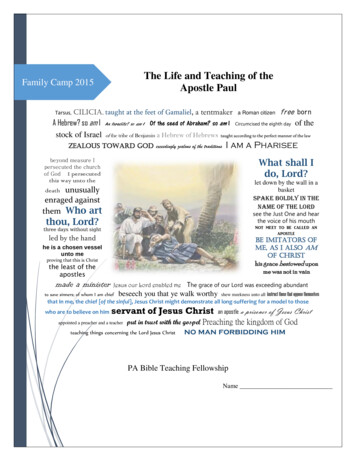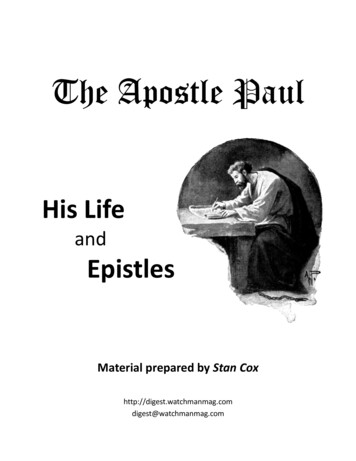
Transcription
The Apostle PaulHis LifeandEpistlesMaterial prepared by Stan .com1
2
Table of ContentsIntroductory Material Biography of PaulThe Conversion and Apostleship of PaulThe Sermons of PaulThe Defenses of PaulThe Chronology of Paul’s LifeMaps of Paul’s 4 journeysPage 5Page 6Page 7Page 8Page 9Page 14Epistle Studies 1 Thessalonians2 Thessalonians1 Corinthians2 ansPhilippians1 TimothyTitus2 TimothyPage 18Page 20Page 22Page 25Page 28Page 31Page 35Page 37Page 40Page 44Page 48Page 52Page 553
4
The Apostle PaulA Concise BiographyThe Apostle Paul is one of the most influential individuals in the history of the Lord’s church. The apostle to the Gentiles, he is themost prolific New Testament writer, having penned at least 13 of the New Testament epistles. His missionary efforts establishedchurches throughout the ancient world. His stand for truth exposed the error of those who sought to corrupt the infant church. Hisdedication and personal character serve as a wonderful example to Christians of every age. His inspired writings shape the theology,work and organization of the church of our Lord. While he was “one born out of due time” (1 Corinthians 15:8), his late entry into theearly history of the church was influential because of this unflagging faith and zeal. He wrote, “So, as much as is in me, I am ready topreach the gospel ” (Romans 1:15). These were not mere words. Evidence of this sentiment is seen in every aspect of his ministry.Paul’s Background His city of birth was Tarsus, the capital city of theRoman province of Cilicia (Acts 22:3). He was of thetribe of Benjamin (Philippians 3:5).His given name was Saul, and Luke uses that nameuntil Acts 13:9, when he writes, “Then Saul, whoalso is called Paul ” From that point on Lukeuniformly calls him Paul.He was raised in Jerusalem, and educated byGamaliel (cf. Acts 5:34), an influential rabbi. (Acts22:3).He was a Pharisee (Acts 23:6; Philippians 3:5), withgreat zeal (Galatians 1:14).He was a Roman citizen (Acts 16:37; 22:25-29)His obsession – Persecuting the church of God(Philippians 3:6; cf. Acts 7:58 – 8:3; 9:1-2)Post conversion purpose – to preach the gospel toall men (cf. Romans 1:15-16), with a special callingto the Gentiles (cf. Acts 9:15-16; 13:46-48)Paul’s Major Life Events Persecuted the Church (Acts 7:58 – 8:3; 9:1-2)Conversion (Acts 9; 22:9-16)First Missionary Journey (Acts 12:25-14:28)Council in Jerusalem concerning the requirement ofcircumcision (Acts 15)Second Missionary Journey (Acts 15:36-18:22)Third Missionary Journey (Acts 18:23-21:17)Arrest and Defenses in Jerusalem (Acts 21 – 26)Journey to Rome, w/ shipwreck (Acts 27:1-28:16)House arrest in Rome (Acts 28:8-31)Note: Acts ends with Paul under house arrest inRome. However, his later epistles tell us a littleabout his life following the two years spent there.o While in prison, he wrote of his desire to visitthe Philippians (Philippians 1:26; 2:24)o Wrote of his desire to visit Philemon in Colosse(Philemon 22)o Tradition has him visiting Spain. He hadexpressed his desire to do so to the Romans(Romans 15:24,28)o Paul’s letters to Timothy and Titus indicatedfurther travels to: Ephesus (1 Tim. 1:3; 3:1415); Macedonia (1 Tim. 1:3); Crete (Tit. 1:5); Miletus (2 Tim. 4:20); back to Ephesus (2 Tim.1:16-18); Troas (2 Tim. 4:13); Corinth (2 Tim.4:20); Nicopolis (Titus 3:12)Paul’s second letter to Timothy indicates a probablesecond imprisonment in Rome, with a harshertreatment (2 Timothy 2:8-9)The Bible does not record his Paul’s deathPaul’s Discourses His sermon at Antioch of Pisidia (Acts 13:15-41)His sermon in Athens (Acts 17:22-32)His address to the Ephesian elders (Acts 20:17-36)His defense at Jerusalem (Acts 22:1-22)His defense before Felix (Acts 24:10-21)His defense before Agrippa (Acts 26:1-29)Paul’s Epistles (In Chronological Order)1 Thessalonians; 2 Thessalonians; 1 Corinthians;2 Corinthians; Galatians; Romans; Philemon; Colossians;Ephesians; Philippians; 1 Timothy; Titus; 2 TimothyPaul’s Autobiography His humility (Acts 14:15; 20:19; 2 Cor. 10:12-18; 12;Gal. 6:14-15)His care for the churches (Acts 15:36; 20:31; Rom.1:9-12; Rom. 9:1-5; 2 Cor. 2:4; 7:8-9; Phil. 1:8;Col. 2:1-3; 1 Thess. 1:2-4; 2:8-9; 3; Philemon 7)His willingness to compromise (Acts 16:3;1 Cor. 8:13; 10:14-15)His unwillingness to compromise (Gal. 2:1-5, 11-21)His sacrifices (Acts 21:13; 2 Cor. 11:16-33;Phil. 4:10-14)His history (Acts 22:3-5,25-28; 26:4-5; Gal. 1:13-14;1 Tim. 1:12-16)His conversion (Acts 22:6-16)His apostleship (Acts 22:17-21; 26:12-20; Rom. 1:1;15:18-21; 1 Cor. 1:1; 4:9-13; 9:1-2; 15:8-10; 2 Cor.1:1; 11:5-6; Gal. 1:1, 11-17; 2:7-10; Eph. 1:1; 3:1-13;Col. 1:1, 24-29; 1 Thess. 2:4; 1 Tim. 1:1; 2:5-7; 2 Tim.1:1; Tit. 1:1)His good conscience (Acts 23:1; 26:9; 2 Tim. 1:3-5)His zeal (Rom. 1:14-16; 10:1; Phil. 3:13-16)His wretchedness (Rom. 7:7-25)A spiritual father to Timothy (1 Tim. 1:2; 2 Tim. 1:2)His confidence (Phil. 1:21-23; 2 Tim. 1:12; 4:6-8)5
The Apostle PaulHis Conversion and ApostleshipPaul’s ConversionPaul’s Apostleship(Acts 9:1-19; Acts 22:1-16)(Acts 9:15-16; Acts 22:13-15; Acts 26:15-18)I.Chief Among SinnersA. But, obtained mercy (1 Tim. 1:15-16)B. An insolent man (1 Tim. 1:12-14)C. Persecution (Acts 7:57 – 8:3; 9:1-2)II.Belief, Repentance, Confession, BaptismA. Belief (acceptance of Jesus as Lord,indicated in conversation with Jesus onthe road to Damascus) (9:3-6)B. Repentance (seen both in hisacknowledgement of Jesus as Lord (9:6;22:9) and in his three days mourning (9:9)C. Confession (acknowledged Lordship ofJesus 9:6) constantly confessed Jesus asLord in his ministry (cf. 1 Cor. 1:9; Gal. 1:35; Eph. 1:3-12; Titus 1:4)D. Baptism (expressed as what Paul “mustdo” [9:6,18], or as the Lord’s instructionsregarding what was required of him[22:10,16]. Purpose: to wash away sins[22:16]).III.Special Notes Concerning Paul’s ConversionA. The Lord’s personal appearance was not acentral or necessary part of hisconversion. Many believe, having “notseen ” (cf. John 20:29).B. Paul was not converted on the road toDamascus. The text clearly states hemust be baptized, and that the baptismwas to “wash away your sins” (Acts22:16). Logically, one can’t be convertedif they still have sins that need to bewashed away. Consider too, the state ofmourning, (cf. 9:9) until such time as hewas baptized. Immediately afterbaptism, he ceased mourning (9:19) (seealso Acts 8:39; 10:48; 16:15; 16:34)I.Apostleship was from God (Gal. 1:1, 11-17)A. A chosen vessel(Acts 9:15; 22:14-15; 26:16)B. Called (Rom. 1:1; 1 Cor. 1:1; 2 Cor. 1:1-2;Eph. 1:1-2; Col. 1:1-3; 1 Thess. 2:4;1 Tim. 1:1-2; 2 Tim. 1:1)C. An eyewitness of Christ(1 Cor. 9:1-2; 15:8-10) cf. Acts 1:21-22D. In no way inferior (2 Cor. 11:5-6)E. Born out of due time (1 Cor. 15:8)F. Least of the apostles(personal worthiness) (1 Cor. 15:8-10)II.To the GentilesA. To make them obedient (Rom. 15:18)B. To preach Him to them(Gal. 1:15-17; 1 Tim. 2:5-7)C. Work committed to him(Gal. 2:1-10; Titus 1:1-4)D. To make them fellow heirs (Eph. 3:1-7)E. Make known the mystery (Col. 1:24-29)IV.His purpose as an ApostleA. To die (1 Cor. 4:9-13).(To be fools for Christ’s sake).B. To labor and work on behalf of every man(Col. 1:28-29)C. To please God, not man(Gal. 1:10; 1 Thess. 2:4-9)6
The Apostle PaulHis SermonsPaul’s Sermon at Antioch of PisidiaPaul’s Sermon at Athens(Acts 13:15-41)(Acts 17:22-32)I.SettingA. Preached this sermon in Antioch of Pisidiaduring his first missionary journey (AD 48)B. See MapC. Sermon was preached in the synagogue,meaning that the audience was Jewish(16), and Paul spoke at their request (15)II.SermonA. Israel the chosen people of God (17)B. Short history of Jewish nation (17-22)C. Note: from this history [esp. the reign ofDavid], an appeal is made concerning thepromised Messiah (23), with Paul claimingJesus to be that Messiah.D. John the Baptist as forerunner (24-25)E. Paul appealed to the Jews here as thosewho “fear God” in contrast to the leadersin Jerusalem (26-27)F. Jewish leadership responsible for Jesus’death (28)G. Resurrection proclaimed (29-31)H. Old Testament prophecies as witness (3237)I. Conclusion: Salvation is through Jesus (3839)J. Warning: Prophecy predicted somewould not believe let it not be so amongthem! (40-41)III.Response to the sermonA. Many Jews accepted the words (43), asdid the Gentiles later (48)B. The next Sabbath, when the Gentileswere added to the audience, the Jewsbecame envious, and led a persecution ofPaul and Barnabas (44-51)IV.Considerations and ApplicationsA. The Old Testament can be used to identifythe MessiahB. Preaching is successful, even if some areled to persecute the preacher due to envyI.SettingA. Preached this sermon in Athens, Greeceduring his second missionary journey (AD51)B. See MapC. Sermon was preached at the Areopaguson the top of Mars Hill (22) at theAthenians request (19)II.SermonA. References the altar to “The UnknownGod”, and proclaims Jehovah to be thatGod (22-23)B. The true God is omnipotent (24), Selfsufficient (25), Sovereign (26), Accessible(27), and our Sustainer (28).C. Such a God should not be worshipped asan idol (29)D. The Athenians are called to repent ofidolatry (30)E. Judgment is proclaimed, the proof ofwhich is Jesus’ resurrection from the dead(31)III.Response to the sermonA. The proclaiming of Jesus’ resurrectionfrom the dead caused dissension (32-33)B. Some believed (34)C. Responses: 1) Mock, [32]; 2) Consider,[32]; 3) Believe! [34]IV.Considerations and ApplicationsA. The ultimate proof of Jesus as theMessiah, as well as the coming judgmentof God is the resurrection of Jesus.B. Note that the resurrection wasproclaimed both to the Jew and GentileC. The evidence concerning the resurrectionis the basis of our faith. The apostleswere eyewitnesses. The open mindedindividual will consider the testimony.The close-minded (then and now) willmock.7
The Apostle PaulHis Defenses of HimselfB. He confesses to being a Christian, and towalking in all good conscience (11-16)C. His sole offense (which was not an offense inthe Pharisee’s eyes) was an appeal to theresurrection of the dead (17-21)Paul’s Defense at Jerusalem(Acts 22:1-22)I.II.III.The Setting (21:15-40)A. Paul had traveled to Jerusalem at the end ofthis third journey, and to appease the Jews hadgone to the temple to purify himself and makean offering (21:15-25)B. The Jews from Asia falsely accused him ofbringing Gentiles into the temple, causing ariot to begin assaulting Paul (21:26-32)C. The Roman commander of the garrison inJerusalem rescued Paul, and at Paul’s request,allowed him to address the Jews (21:31-40)Paul’s Defense (22:1-22)A. His early life, up to his conversion (1-5)B. His conversion (6-16, cf. Acts 9) Appearance of Jesus on the road toDamascus His baptism in the city (16)C. His commission to go to the Gentiles (17-21).Note, he here convicted the Jews of unbelief,and the martyrdom of StephenIII.Paul’s Defense Before Herod Agrippa(Acts 26:1-29)I.The Setting (24:27 – 26:1)A. Festus replaces Paul, and when he speakswith Paul, Paul makes an appeal to Caesar(24:27 – 25:12)B. Festus talks to Herod Agrippa about Paul,and Agrippa expresses his desire to speakto Paul (25:13-27)II.Paul’s Defense (26:2-29)A. Paul claimed to have been accusedbecause of his belief in the resurrection(2-8)B. Paul’s persecution of the church, and hisconversion to Christ (9-18)C. Paul’s life of preaching, he claimed, iswhat caused the Jews to make theiraccusations. He was persecutedbecause of his faith (19-23)D. Festus called him crazy (24-25)E. Paul expressed to Agrippa that he wasaware of Agrippa’s knowledge of thescriptures and the promise of the Messiah(26-27)F. Agrippa notes the power of Paul’s words(28-32)III.The Result (26:32)A. Agrippa notes his innocence, but becausePaul had made his appeal to Caesar, itnecessitated a journey to Rome (cf. 27 –28)The Result (22:22 - 23:10)A. The Jews became enraged at his statementconcerning the Gentiles (22:22-24)B. The Roman commander took him away, andwould have beaten him if Paul had notrevealed himself to be a Roman citizen(22:24-29)C. Paul was brought before the Sanhedrin, andby siding with the Pharisees regarding theresurrection, caused division (22:30 – 23:10)Paul’s Defense Before Felix(Acts 24:10-21)I.II.The Setting (23:10 -35)A. The Roman commander sent Paul to Felix atCaesarea to spare him from Jewish plot to kilhim (23:11-33)B. Felix agree to hear him when his accuserscame, and imprisoned Paul at Herod’sPraetorium (for 5 days) (23:34 – 24:1)C. The Jewish accusations (24:1-9)The Result (24:22–27) Felix does nothing(procrastinates) until being replaced by Festus.This requires Paul to defend himself againPaul’s Defense (24:10-21)A. No proof of the accusation (10-13)8
Chronology of Paul’s Life and Ministry(Acts 7-28)Note: Information given regarding the place and time ofPaul’s writings is taken from Conybeare and Howson’s,“The Life and Epistles of St. Paul”. The chronologyitself is an outline of the book of Acts as it reveals Paul’slife and ministry.I.Saul’s Introduction (Acts 7) Stephen preached the gospel before thehigh priest in Jerusalem (Acts 6:8 – 7:53). Saul of Tarsus was present at Stephen’sstoning (Acts 7:54-60, esp. 58). Saul was identified as a chief persecutor ofChristians (Acts 8:1-3).II. Saul’s Conversion (Acts 9) The purpose of his trip to Damascus was topersecute Christians (9:1-3). The Lord’s appeared to him on the road toDamascus (9:3-8). Saul entered Damascus and waited forinstructions (9:8-9). Annanias came to Saul to instruct him inwhat he “must do” (9:10-19).III.Saul in Damascus (9:20-22) Immediately upon his conversion Saulbegan preaching (9:20). Saul confounded the Jews in Damascus(9:21).IV.Saul in Jerusalem (9:26-31) Saul was received by the brethren atBarnabas’ testimony (9:26-28). The first attempt (of many) on Saul’s life bythe Hellenists in Jerusalem (9:29). Brethren helped him escape to Caesarea,then to Tarsus, his hometown (9:30). The church multiplied and prosperedthroughout Judea, Galilee and Samaria(9:31).V.Saul and Barnabas at Antioch (11:19-30) The church at Jerusalem sent Barnabas toAntioch (of Syria) because of preachingsuccess there (11:19-24). Barnabas departed to Tarsus to get Saul andbring him to Antioch. They remained there,preaching for a whole year (11:25-26). Agabus, a prophet, predicted a famine inJudea. The church in Antioch sentBarnabas and Saul to Jerusalem withbenevolent help (11:27-30).VI. Saul and Barnabas’ first missionary journey(Acts 12:25 – 14:28) They returned from Jerusalem to Antioch,and brought John Mark with them (12:25). The church at Antioch sent Barnabas andSaul away to preach (13:1-3). - Seleucia (13:4). - Salamis, Cyprus (13:5) Preached inSynagogue (John Mark with them). - Paphos, Cyprus (13:6-12).o Withstood false prophet Bar-Jesus(Elymas).o Converted the procounsel SergiusPaulus (an intelligent man,astonished at the teaching of theLord).o NOTE: Saul began to be referredto as Paul (13:9). - Perga in Pamphylia (sailed over 100 miles)(13:13) John Mark left, and returned toJerusalem, leading to a later disagreementbetween Paul and Barnabas (cf. 15:36-41). - Antioch in Pisidia (13:14-50).o Paul preached in the synagogue(13:15-41).o Paul preached to the Gentiles(13:42-50) Jews stirred up unrest tothe point of persecution, and theywere expelled from the city. - Iconium (13:51 – 14:5).o Many Jews and Greeks believed thegospel (14:1).o Unbelieving Jews stirred up trouble,dividing the city. Enemies sought tostone them (14:2-5). - Lystra and Derbe (and surrounding region)(14:6-20).o – Lystra attempted to worship Pauland Barnabas (14:8-18).9
o – Paul was stoned by multitudes(stirred up by Jews from Antioch andIconium) (14:19-20).o – Paul and Barnabas went to Derbe,where many were converted (14:2021).- Returned to Lystra, Iconium and Antioch(14:21-23) Strengthened brethren andappointed elders.- Back to Perga, then to Attalia (14:24-25).- Returned to Antioch in Syria (14:26-28)Reported on their success. Stayed a longtime.VII. Paul and Barnabas challenged by JudaizingTeachers (15:1-35) Certain men from Jerusalem came toAntioch claiming circumcision wasnecessary to salvation (15:1,5). A Decision was made to travel to Jerusalemto talk with the apostles and settle the issue(15:2-4). The Apostles and Elders in Jerusalem met:Peter, Paul and Barnabas and James spoke(15:6-21). A letter was composed, and men werechosen to accompany Paul and Barnabas todeliver the letter to Antioch (15:22-35).VIII. Paul and Barnabas had sharp dissensionover John Mark (15:36-41) Barnabas wanted John Mark to accompanythem on the second journey. Pauldisagreed (15:36-39). Paul and Barnabas parted company. Paultook Silas with him on his secondmissionary journey (15:39-41).IX. Paul and Silas embarked upon Paul’s secondMissionary Journey (15:40 – 18:22) - Churches in Syria and Cilicia (15:41). - Derbe and Lystra (16:1-5) Picked upTimothy, a young man well spoken of by thedisciples there. (Timothy was circumcised toaccommodate the Jews). - Regions of Phrygia and Galatia (16:6)Forbidden by the Holy Spirit from going toAsia. - Region of Mysia (16:7-10) Passed throughto the coast, to Troas. o Holy Spirit forbad them go toBithynia (16:7).o In Troas, Paul had a vision,concluding that he was to go toMacedonia to preach (16:8-10).- Sailed to Samothrace, then Neapolis (onthe way to Philippi) (16:11).- Philippi (16:12-40).o Lydia and her household converted(16:12-15).o Paul and Silas imprisoned forexorcising a spirit of divination in aslave girl (16:16-24).o Philippian Jailor and his householdconverted (16:25-34).o Paul and Silas released from prison.Paul appealed to his Romancitizenship (16:35-40).- Amphipolis and Apollonia on the way toThessalonica (17:1).- Thessalonica (17:1-9) Paul preached in thesynagogue and divided the city.- Berea (17:10-14) Paul’s preaching was wellreceived, but those from Thessalonica cameand caused trouble for him there.Note: Silas and Timothy remained inBerea (17:14), and did not rejoin Paul untilhe was in Corinth (18:5).- Athens (17:15-34).o Reasoned in the synagogue, takenby Greeks to the Areopagus, tospeak to them (17:16-21).o Paul’s sermon at the Areopagus(17:22-34) Some mocked, othersbelieved.- Corinth (18:1-17).o Paul met, stayed with and madetents with Aquila and Priscilla (18:3).o Paul preached every Sabbath in thesynagogue, converting both Jewsand Greeks (18:4-8).o The Lord spoke to Paul in a vision,calling him to boldness. Paulpreached there for 18 months (18:911).o There was much Jewish oppositionand unrest between Jews andGentiles (18:12-17).10
1 Thessalonians and 2 Thessalonians are believed to havebeen written during the months Paul spent in Corinth.Internal evidence of this is strong. - Cenchrea (18:18) Where Paul had his haircut off, having taken a vow.- Ephesus (18:19-21).- Caesarea (18:22).- Jerusalem (18:22) Where Paul greeted thechurch.- Antioch (18:22).X. Paul embarked upon his third MissionaryJourney (18:23 – 21:17) Note: among this traveling companions Timothy, Erastus (19:22); Gaius andAristarchus (19:29). - Regions of Galatia and Phrygia (18:23) Thisportion of the trip may have included visitsto cities such as Derbe, Lystra, Iconium, andAntioch of Pisidia, where Paul had plantedchurches. His purpose in returning tothese places was to edify the saints. - Ephesus (19:1-41).o Preached the gospel to discipleswho knew only the “baptism ofJohn.” (Perhaps these wereindividuals who had embraced theteaching of Apollos, cf. 18:24-26)(19:1-7).o Preached in the synagogue inEphesus (19:8).o When opposed by the Jews, hebegan to teach in the school ofTyrannus, doing this for two years.In this time, “all who dwelt in Asiaheard the word of the Lord Jesus,both Jews and Greeks” (19:9-10).o Through Paul’s preaching andmiracles, “the word of the Lord grewmightily and prevailed” (19:11-20).o Those who fashioned idols opposedPaul, resulting in confusion and riotin the city (19:21-41).1 Corinthians was written during Paul’s sojourn inEphesus. - Traveled to region of Macedonia (20:1-2)This portion of the trip may have includedvisits to cities such as Smyrna, Peramum,Adramyttium, Assos, Troas, Samonthrace,Philippi, Amphipolis, Thessalonica andBerea. Again, his purpose was to edify thesaints. He “encouraged them with manywords.”Conybeare believes 2 Corinthians was written while Paulwas in Philippi (of Macedonia) before his voyage back toTroas - Greece (20:2-3) Possibly Athens andCorinth, where he remained for threemonths before returning to the region ofMacedonia.Galatians may have been written while Paul was inCorinth.The book of Romans was written while Paul sojournedfor 3 months in Corinth. - Back to Troas (20:3-12).o Reverse the list of cities above toretrace Paul’s possible route fromGreece to Troas.o His traveling companions: Lukehimself (seen through his use of thepronoun “we”) Sopater of Berea,Aristarchus, Secundus of theThessalonians, Gaius of Derbe,Timothy, Tychicus and Trophimus.(20:4). These men preceded Paul toTroas.o Paul sailed from Philippi to Troas.A five days journey (20:6).o Stayed a week in Troas, awaiting the“first day of the week”, when Paulmet the disciples there andpreached to them. He raised ayoung man from the dead (20:7-12).- Assos (20:13).- Mitylene (20:14).- Chios (20:15).- Samos (20:15).- Miletus (20:15-38).o Note: Paul had determined to sailpast Ephesus, so that he could11
XI.return to Jerusalem more quickly(20:16).o Paul called for elders at Ephesus tocome to him at Miletus, where hesaid goodbye to them, andadmonished them to steadfastness(20:17-38).o Note: He indicated he expectedtrouble in Jerusalem (20:22-23).- Cos (21:1).- Rhodes (21:1).- Patara (21:1).- Tyre (21:2-6). Met with disciples whowarned Paul not to go to Jerusalem.- Ptolemais (21:7).- Caesarea (21:8-14).o Paul stayed in the house of Philipthe evangelist, who had 4 virgindaughters who prophesied. Stayedthere for many days (21:8-10).o The prophet Agabus predicted Paulwould be bound by the Jews, anddelivered up to the Gentileauthorities. Paul was encouragednot to go to Jerusalem (21:10-14).- Arrived in Jerusalem, ending his journey(21:15-17).Paul’s Arrest (21:18-26:32) Paul met with James and the elders of thechurch in Jerusalem (21:18-25). They urgedhim to take a vow, and purify himself in thetemple, to appease the Jews. Paul’s attempt to appease the Jews wasunsuccessful. The Jews falsely chargedhim with bringing a Gentile into the temple.The mob threatened to kill Paul (21:26-30). The Roman garrison commander stoppedthe lynching and took Paul into custody(21:31-36). Paul asked permission and was granted theopportunity to speak to the Jews (21:27 –22:21). His speech infuriated the Jews, and so theRoman soldiers took Paul away (22:22-24). Paul revealed himself to be a Roman to theCenturion (22:25-29). Paul addressed the Sanhedrin in his owndefense (22:30 – 10). XII. A plot to kill Paul was thwarted, leading theRoman commander to send Paul toCaesarea, where Paul was presented toFelix, the governor of Judea (23:11-35).The high priest came to Felix, accusing Paulfalsely (24:1-9).Paul defended himself before Felix (24:1021).Felix procrastinated, doing nothing for twoyears, until he was succeeded as governorby Festus (24:22-27).The Jews again falsely accused Paul beforeFestus, in response Paul appealed to Caesar(25:1-12).Festus explained to King Agrippa thecircumstances surrounding Paul’s arrest(25:13-27).Paul defended himself before Agrippa(26:1-32).Paul’s Journey to Rome (27:1 – 28:16)Journey began at Caesarea, with theintention of sailing along the coasts of Asiato Italy. (27:1-2). Note: Aristarchus ofThessalonica accompanied Paul and Luke.- Sidon (27:3). The centurion Juliusallowed Paul to go to his friends, and“receive care”- Myra (27:4-6). A city of Lycia. At Myra,the centurion found a ship bound to Italy- Fair Havens (27:7-8). A place “near thecity of Lasea.”Despite Paul’s warning to stay therethrough the winter, they set sail, intendingto reach Phoenix (27:9-12)Due to a storm, Phoenix was bypassed, andthe ship sank off of Malta (27:13-44).o After many days at sea, Paulreceived a message from an angel ofGod that all onboard would bespared (27:20-26).o All 276 persons on board made itsafely to land (27:37-44).- Malta (28:1-10). Remained there for 3months.o Paul bit by a viper, but unharmed(28:1-6).12
o Paul healed the father of Publius, aleading citizen of the island (28:710).- Syracuse (28:11-12).- Rhegium (28:13).- Puteoli (28:13-14).- Appii Forum & Three Inns (28:14-15).Met by brethren while there.- Rome (28:16). Note: Paul put underhouse arrest.XIII. Paul’s Ministry at Rome (28:17-31) Paul addressed the Jews in Romeconcerning the accusations raised againsthim (28:17-22). Paul preached to the Jews (28:23-29). Paul remained in Rome for two years, underhouse arrest, but was allowed to preach(28:30-31).Philemon was probably penned by Paul while underhouse arrest in Rome. Onesimus was sent to Colosse withTychicus, bearing both the letter to Philemon, and theletter to the Colossian church. (cf. Col. 4:7-9)Colossians was written by Paul while under house arrestin Rome. See paragraph above.Ephesians was also written by Paul while under housearrest in Rome, around the same time as the letter to theColossians.Philippians was probably the final letter (of the four inthe canon) written during Paul’s imprisonment in Rome.XIX. Paul’s Life After His Roman Imprisonment Acts ends with Paul in Rome. Little isknown of his ministry and travels followinghis Roman imprisonment. He revealed inhis letters to Timothy and Titus that hetraveled to Ephesus (1 Timothy 1:3; 3:1315), Macedonia (1 Timothy 1:3), Crete (Titus1:5), Miletus (2 Timothy 4:20), back toEphesus (2 Timothy 1:16-18), Troas (2Timothy 4:13), Corinth (2 Timothy 4:20),and Nicopolis (Titus 3:12). Paul’s second letter to Timothy indicates aprobable second imprisonment in Rome,with a harsher treatment (2 Timothy 2:8-9).While we can’t know for sure, (the Bible does not tell of Paul’s death), it may be thathe died in Rome during his secondimprisonment.Other possible destinations (as Paulindicated his desire): Philippi (Philippians1:26; 2:24); Colosse (Philemon 22); andSpain (Romans 15:24,28).The final three epistles Paul wrote were penned sometime after his first imprisonment in Rome. Most agreethat 1 Timothy was written first. Then Titus. Then,finally, shortly before his death, Paul wrote 2 Timothy.Conclusion:An attempt to place dates uponeither the individual events in Paul’s life, or thedates of writing are subject to dispute. Further,because of calendar errors, it is possible forindividuals to be referring to basically the samechronology, using numbers up to 4 years apart.In their Appendix III (pages 832-834) Conybeare andHowson, give the following dates, which will help toset a time frame: 36 AD – Paul’s Conversion48 AD – First Missionary Journey Begins51 AD – Second Missionary Journey Begins52 AD – Writes 1 Thessalonians53 AD – Writes 2 Thessalonians54 AD – Third Missionary Journey Begins57 AD – Writes 1 Corinthians57 AD – Writes 2 Corinthians57 AD – Writes Galatians58 AD – Writes Romans61 AD – Arrives at Rome62 AD – Writes Philemon62 AD – Writes Colossians62 AD – Writes Ephesians62 AD – Writes Philippians67 AD – Writes 1 Timothy67 AD – Writes Titus68 AD – Writes 2 Timothy (from prison inRome)68 AD – Executed13
[Type here]Antioch of Syria (13:1-3). Seleucia (13:5). Sail to Salamis of Cyprus (13:5). Paphos of Cyprus (13:6-12).Sail to Perga of Pamphylia (13:13). Antioch in Pisidia (13:14-50). Iconium (13:51—14:5). Lystra and Derbe (14:6-20).Return to Lystra, Iconium and Antioch (14:21-23). Return to Perga, then Attalia (14:24-25).Sail back to Antioch of Syria (14:26-28).14
[Type here]Churches in Syria and Cilicia (15:41). Derbe and Lystra (16:1-5). Regions of Phrygia and Galatia (16:6).Region of Mysia (16:7-10). Samothrace and Neapolis (16:11). Philippi (16:12-40). Amphipolis and Apollonia (17:1).Thessalonica (17:1-9). Berea (17:10-14). Athens (17:15-34). Corinth (18:1-17). Cenchrea (18:18). Ephesus (18:1921).Jerusalem (18:22). Antioch of Syria (18:22)Caesarea (18:22).15
[Type here]Regions of Galatia and Phrygia (18:23); Ephesus (19:1-41); Region of Macedonia (20:1-2); Greece (20:2-3);Philippi (20:6); Troas (20:7-12); Assos (20:13); Mitylene (20:14); Chios (20:15); Samos (20:15); Miletus (20:15-38);Cos (21:1); Rhodes (21:1); Patara (21:1); Tyre (21:2-6); Ptolemais (21:7); Caesarea (21:8-14); Jerusalem (21:15-17)16
[Type here]Caesarea (27:1-2); Sidon (27:3); Myra (27:4-6); Fair Havens (27:7-8);Storm drove them past Phoenix, across to Malta, where they were shipwrecked (27:9 – 28:10);Syracuse (28:11-12); Rhegium (28:13); Puteoli (28:13-14); Appii Forum & Three Inns (28:14-15); Rome (28:16)17
[Type here]1 ThessaloniansMetadata Letter written (AD 52) during Paul’s secondmissionary journey while Paul was in Corinth(cf. Acts 18:1-17). Paul was in Corinth for 18months (vs 11).Thessalonica was a seacoast city (Thermaic gulf,of the Agean Sea), in the province ofMacedonia. During Paul’s time it was a freeRoman city. The city had much commerce(Egnatian Road, a natural harbor made it animportant seaport). Diverse citizenship.Apparently, the congregation established inThessalonica was primarily Gentile. (cf. Acts17:4; 1 Thessalonians 1:9)The Epistle has been divided into 5 chaptersand 89 verses.Chapter Synopses1. The tone of Paul’s letter was one of2.3.Outline of BookI.II.Paul’s relationship with them (1-3)A. Author identification (1:1)B. Paul thanks them (1:2-10)C. Paul’s record (2:1-16)D. His current status (2:17 - 3:10)E. His prayer for them (3:1-13)4.Exhortations and Teachings (4-5)A. The proper Christian walk (4:1-12)B. The Lord’s second coming (4:13
The Apostle Paul A Concise Biography The Apostle Paul is one of the most influential individuals in the history of the Lord’s church. The apostle to the Gentiles, he is the most prolific New Testament writer, having penned at least 13 of the New Testament epistles. His missionary efforts established churches throughout the ancient world.
